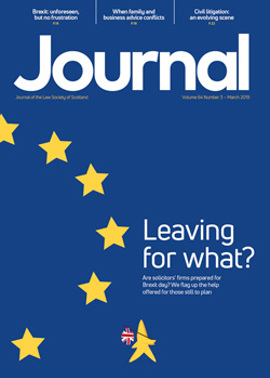Ready to leave?
What word comes to mind when you think about Brexit and its potential impact on your business/organisation?
This question formed part of the Law Society of Scotland’s seven focus groups on Brexit with high street and in-house solicitors. We met with over 140 solicitors in Aberdeen, Inverness, Perth, Edinburgh and Glasgow from 30 January and during February.
The most common word in our word map… uncertainty
Uncertainty can be an unfamiliar concept to solicitors, especially those who are used to interpreting and applying the law to the facts. In some cases, there may be only two outcomes. The judge accepts your interpretation of the facts and the law or they don’t.
Brexit may impact on every one of us in both our professional life and our personal life. It was important to find out how our members are feeling about Brexit and to highlight resources that may assist them in advising clients. We also wanted to offer support so that no member feels isolated or anxious about what Brexit might mean for them.
How prepared are we?
The level of preparation for whatever might happen with Brexit varied. High street practitioners told us that they had not prepared very much for Brexit. In general, in-house solicitors appeared to suggest a higher level of preparation, including the setting up of working groups, checklists and seeking external legal advice on potential future scenarios.
What are clients saying?
It appears that individual clients have not really been seeking advice on Brexit. Many of the requests for advice on Brexit appear to be coming from businesses and organisations with in-house solicitors. Our annual members’ survey conducted in November and December 2018 told us that 24% of respondents (solicitors and trainee solicitors) have given advice on Brexit to clients.
For our in-house members, ongoing uncertainty is resulting, to an extent, in the need to adopt a “wait and see” approach. In particular, in-house solicitors reported that they are being asked for advice on data protection, employment practices and settled status of employees, import/export licences, EU labelling of products (including CE marking), intellectual property rights and state aid.
Beware unintended consequences
While Brexit may not impact on you directly, concerns were raised about the possibility of unforeseen or indirect consequences flowing from Brexit, primarily in relation to the economy. While we have no control over economic ups and downs, understanding what is happening in your local area or sector might assist you in business planning. For example, how is the housing market behaving? Is there a slowdown in business investment?
Making contract provision
The use of Brexit clauses appears to be on the increase, especially in commercial contracts. Organisations and businesses are trying to protect themselves and to pass on uncertainty to others. The advice from the focus groups was to identify what exactly your business or client is trying to protect against and to draft a clause that specifically covers that concern. Wide-ranging Brexit clauses are likely to be resisted as far as possible.
Although not a case about Brexit clauses, it is worth mentioning the recent English High Court case of Canary Wharf v European Medicines Agency [2019] EWHC 335 (Ch), which is the first high-profile case to look at the commercial consequences of Brexit, and which held that the EMA’s lease cannot be terminated by frustration as a result of the UK’s departure from the EU and subsequent relocation of the EMA to the Netherlands. (See also the feature on p 16.)
There will continue to be a legal profession in Scotland. It may need to change and adapt to the “new normal” after Brexit (whatever form that takes), but businesses, organisations and individuals will continue to need legal advice.
So what can you do today?
Think about risk. What would cause your business or organisation difficulty in continuing business as usual? Some future decisions may be commercially driven. Other decisions may focus on your client base and areas of focus.
Awareness is key. While we may not have many answers yet, by knowing what questions you need answered and how your business or organisation may be most affected by Brexit, you can hopefully spring into action once we have more certainty on how Brexit will develop.
Our website continues to be updated with submissions we have made to both the Scottish Parliament and the UK Parliament on Brexit. It also contains links to useful websites which may guide you further. If you would like further information on our Brexit work, please contact Katie Hay, head of International at katiehay@lawscot.org.uk
In this issue
- How will Brexit affect my mother-in-law?
- Settling the debate on sequestration
- Taking wellbeing seriously
- How will personal data continue to flow after Brexit?
- Buildmark, and a little extra help for NHBC
- Reading for pleasure
- Opinion: Laurie Anderson
- Book reviews
- Profile: Lord Mackay of Clashfern
- President's column
- People on the move
- Is your legal software ready to remain compliant in 2019?
- What's the deal?
- Ready to leave?
- A tapering opportunity
- Brexit: no dealbreaker either
- The business of divorce
- Trailblazing 12
- Cohabitants: rebalancing the law
- Litigation: an evolving scene
- Chain transactions
- When delay is not fatal
- Data protection – deal or no-deal?
- Two cases and an order
- Reshaping trade mark law
- When the wheels come off
- Parentage or privacy?
- Access right, right of access or right of way?
- Team of one
- Public policy highlights
- OPG update
- Housing specialism added to accreditation list
- At the boundary's edge
- Keep the dual role
- Executry and trust accounting: new guidance
- Moving nightmares
- Accredited paralegal update
- Sign up for conference
- Accredited Paralegal Committee profile
- Ask Ash






